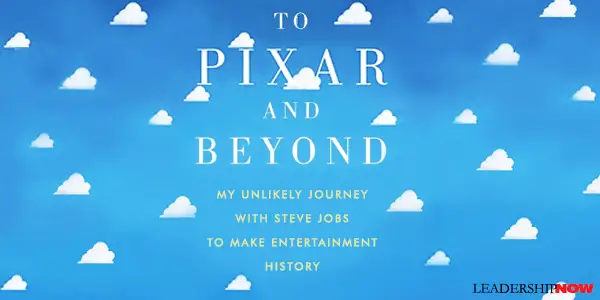5 Leadership Lessons: To Pixar and Beyond

FROM A PICTURE IN A MAGAZINE, Lawrence Levy was asked by Steve Jobs to become the CFO of Pixar and structure it in a way that investors could understand it. The trick was to preserve whatever it was about Pixar that enabled great stories to happen in the process. And he captures well how that was done.
While the nuts and bolts of this story has been told before, Levy creates from his perspective, a very readable account by weaving his own growth along the way.
To Pixar and Beyond: My Unlikely Journey with Steve Jobs to Make Entertainment History is a personal story. It's hard to put down. Here are some of the key takeaways:
 There’s nothing you can do about where the pieces are. It’s only your next move that matters.
There’s nothing you can do about where the pieces are. It’s only your next move that matters.
 Corporations are like living creatures. They have personalities, emotions, and habits. The person at the top might seem to be calling all the shots but is often imprisoned in a culture he or she can do little to change. s corporations, succeed, they generally become more conservative. The flames of creativity on which a company is built can easily cool as pressures to perform mount. Success brings something to defend, something to lose. Fear can easily trump courage.
Corporations are like living creatures. They have personalities, emotions, and habits. The person at the top might seem to be calling all the shots but is often imprisoned in a culture he or she can do little to change. s corporations, succeed, they generally become more conservative. The flames of creativity on which a company is built can easily cool as pressures to perform mount. Success brings something to defend, something to lose. Fear can easily trump courage.
 I felt really proud of our decision [to give control to the creative team and not the executive team]. We had chosen to truly empower talent, to send a signal to Pixar’s creative leaders that we trusted them. I cannot say this approach would be right for every company. But I can say that whether you’re making bottled water, mobile games, or computer chips, the decision of who has control over the creative elements is among the most important any team will make. Fear and ego conspire to rein in creativity, and it is easy to allow creative inspiration to take a back seat to safety. It is one thing to cite the adage “Story is king.” It is another thing entirely to live by it.
I felt really proud of our decision [to give control to the creative team and not the executive team]. We had chosen to truly empower talent, to send a signal to Pixar’s creative leaders that we trusted them. I cannot say this approach would be right for every company. But I can say that whether you’re making bottled water, mobile games, or computer chips, the decision of who has control over the creative elements is among the most important any team will make. Fear and ego conspire to rein in creativity, and it is easy to allow creative inspiration to take a back seat to safety. It is one thing to cite the adage “Story is king.” It is another thing entirely to live by it.
 The natural tendency in negotiation is to engage in positional bargaining. This means taking a position knowing that it is not a final position, and holding in reserve a backup position. The danger of positional bargaining is that it forces you to think about backup positions, which weakens your conviction in your original position. It’s like negotiating against yourself. Plan A may be your optimal outcome, but inwardly you have already convinced yourself to settle on Plan B.
The natural tendency in negotiation is to engage in positional bargaining. This means taking a position knowing that it is not a final position, and holding in reserve a backup position. The danger of positional bargaining is that it forces you to think about backup positions, which weakens your conviction in your original position. It’s like negotiating against yourself. Plan A may be your optimal outcome, but inwardly you have already convinced yourself to settle on Plan B.
Both Steve and I had a strong distaste for approaching negotiations this way. We preferred to develop our positions without thinking through a backup… Once Steve decided what he wanted in a negotiation, he developed something akin to a religious conviction about it. In his mind, if he didn’t get what he wanted, nothing else would take its place, so he’d walk away…. The risk, however, was in so overreaching that we would end up with nothing. If we were not going to have a backup plan, we had to be very careful about knowing what we wanted.
 We can build extraordinary organizations that foster creativity, dignity, and humanity while respecting business disciplines. We just have to be tuned to it; we have to be willing to balance bureaucracy with the depth and subtlety of creative inspiration, and awareness of the human dimension of our endeavors.
We can build extraordinary organizations that foster creativity, dignity, and humanity while respecting business disciplines. We just have to be tuned to it; we have to be willing to balance bureaucracy with the depth and subtlety of creative inspiration, and awareness of the human dimension of our endeavors.
We humans do better when we have something to ground us, a deep source from which we can draw wisdom, insight, and inspiration. The goal of that source is to empower us, to bring depth and fulfillment to our lives, to give us the means to soar.
* * *

Like us on
Instagram and
Facebook for additional leadership and personal development ideas.
* * *




Posted by Michael McKinney at 08:36 AM
Permalink
| Comments (0)
| This post is about Five Lessons











